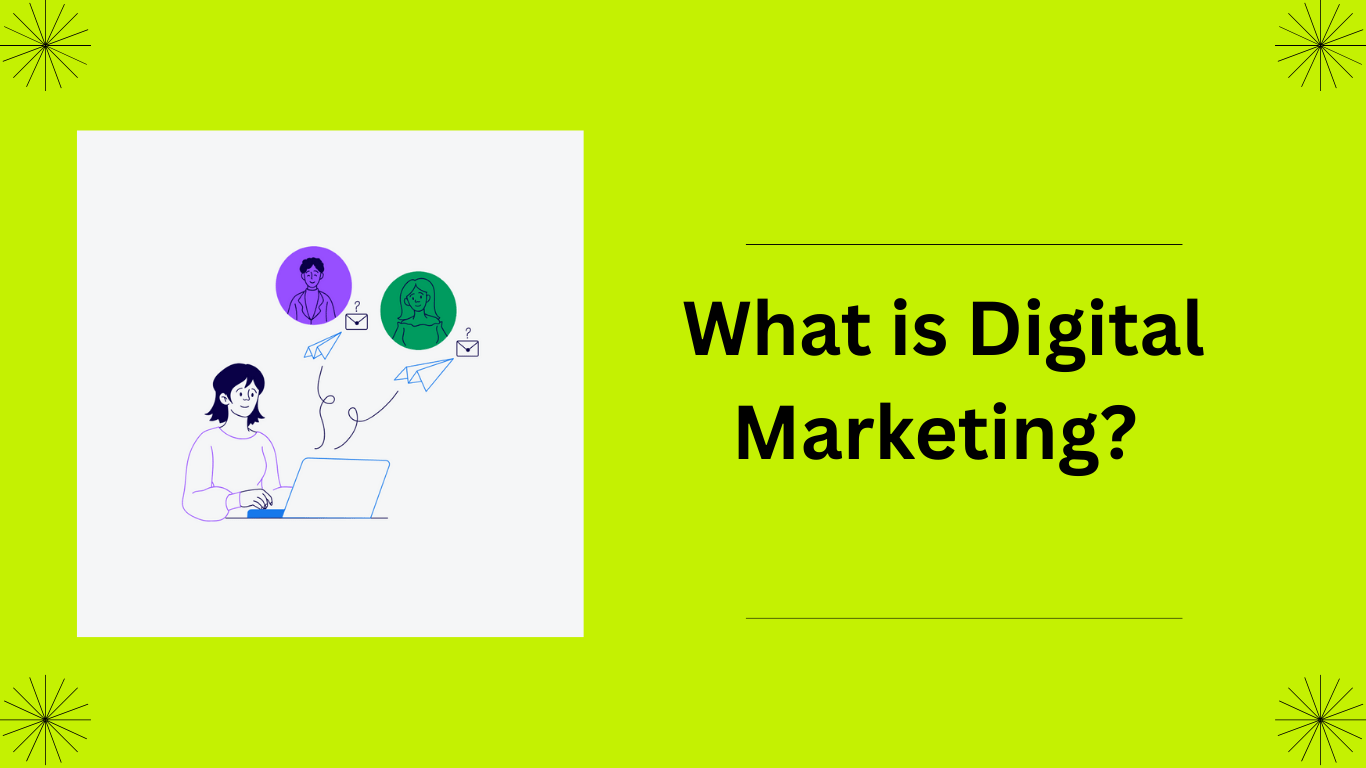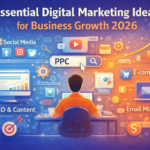
Discover the essentials of Digital Marketing in this comprehensive guide
Introduction to Digital Marketing
Digital marketing refers to the use of digital channels and technologies to promote products or services. It encompasses a wide range of activities aimed at connecting with potential customers online. Discover the essentials of Digital Marketing key components include search engine optimization (SEO), social media marketing, email marketing, content marketing, and pay-per-click advertising, among others. This comprehensive approach allows businesses to reach and engage their target audience effectively through multiple digital platforms.
Table Of Content
In contrast to traditional marketing, Discover the essentials of Digital Marketing which often relies on print media, television, and direct mail, digital marketing prioritizes online channels that are both cost-effective and measurable. Businesses can track user interactions in real-time, monitoring the performance of their campaigns and adjusting strategies as necessary. This adaptability is one of the primary reasons digital marketing has gained prominence in recent years, as it ensures budget efficiency and targeted outreach.
The significance of digital marketing in today’s business landscape cannot be overstated. As consumers increasingly turn to the internet for information and purchasing decisions, companies must cultivate an online presence to stay competitive. Digital marketing enhances a brand’s visibility, fosters relationships with customers, and builds loyalty by engaging users in meaningful ways. For instance, social media platforms enable direct communication between brands and consumers, making it easier to gather feedback and tailor products or services toward user preferences.
In summary, digital marketing is essential for businesses seeking to thrive in a rapidly changing environment. Its differences from traditional marketing highlight a shift toward the digitalization of consumer interactions, necessitating a strategic approach for any brand aiming to leverage the full potential of the digital landscape.
Key Components of Digital Marketing
One of the cornerstone elements is search engine optimization (SEO), which involves optimizing website content to improve visibility on search engines. Effective SEO techniques enhance organic traffic by utilizing keyword research, on-page optimization, and backlink strategies to ensure higher rankings in search results. Improving visibility not only attracts potential customers but also builds credibility and trust within a given marketplace.
Another vital component is content marketing. Discover the essentials of Digital Marketing this involves creating valuable and relevant content aimed at attracting and engaging a specific audience. Content marketing can take various forms, including blog posts, videos, infographics, and podcasts, all designed to provide information or entertainment that resonates with the target demographic. When executed properly, content marketing contributes to brand awareness and fosters long-term customer loyalty.
Social media marketing is also a crucial aspect of digital marketing. This entails leveraging platforms such as Facebook, Twitter, Instagram, and LinkedIn to promote brand messages and engage with audiences directly. The interactive nature of social media allows for real-time feedback and interaction, paving the way for deeper connections with customers.
Email marketing remains one of the most cost-effective digital marketing strategies, utilizing email campaigns to reach current and potential customers. This strategy focuses on delivering personalized content, promotions, and updates directly to users’ inboxes, fostering a sense of loyalty and encouraging repeat business.
Lastly, pay-per-click (PPC) advertising plays a significant role in digital marketing. By allowing businesses to place ads on search engines and social media platforms, PPC provides immediate visibility to targeted audiences. This method enables advertisers to bid for keywords, ensuring that they reach users actively seeking their products or services.
The Role of SEO in Digital Marketing
Search Engine Optimization (SEO) is a critical component of digital marketing that focuses on enhancing a website’s visibility in search engine results pages (SERPs). By understanding how search engines operate, businesses can improve the chances of their websites being found by potential customers. At its core, SEO is about attracting organic traffic, which can significantly reduce acquisition costs compared to paid advertising strategies.
SEO operates through several intricate processes that work together to elevate a website’s position in search engine rankings. These processes include keyword research, where marketers identify the words and phrases that target audiences input into search engines. Choosing the right keywords is vital, as it directly influences the search engine’s ability to match relevant content with user queries.
Once keywords are identified, implementation follows within the content on the website. This aspect is known as on-page SEO, which encompasses optimizing title tags, meta descriptions, headers, and images. Additionally, creating high-quality, relevant content that addresses the needs of users is essential for on-page optimization. Content should provide value and engage visitors, as search engines prioritize user satisfaction.
Off-page SEO, another key strategy, involves activities outside of the website, primarily focusing on building credibility and authority through link-building initiatives. Acquiring backlinks from reputable sites enhances a page’s authority in the eyes of search engines, which can positively impact rankings. Promotion through social media and online community engagement also contributes to off-page SEO by driving traffic and facilitating connections with target audiences.
Ultimately, a well-executed SEO strategy serves as a backbone for digital marketing efforts, enabling businesses to reach their target audience effectively and compete in an increasingly digitized marketplace.
Content Marketing Strategies
Content marketing is a fundamental component of digital marketing that focuses on creating, distributing, and promoting valuable content to attract and engage a targeted audience. The significance of content marketing lies in its ability to foster trust and build relationships between brands and their consumers. By delivering relevant and informative content, businesses can establish themselves as thought leaders within their industry, ultimately driving traffic and improving conversion rates.
There are several types of content that businesses can utilize in their marketing strategies. These include traditional blog articles, engaging videos, informative infographics, and dynamic social media posts. Each format serves different purposes and can appeal to various segments of the target audience. For example, blog posts enable deep dives into subject matter, while videos can quickly convey key messages and evoke emotions. Infographics, on the other hand, can simplify complex information visually, while social media posts allow brands to communicate with their audience in real-time, fostering engagement and interaction.
To craft compelling content that engages audiences effectively, it is crucial to adhere to best practices. First and foremost, content should be tailored to the preferences and needs of the target audience. This necessitates thorough market research and an understanding of the audience’s pain points. Additionally, the content must provide value; whether it informs, entertains, or inspires, it should resonate with the audience to stimulate interaction. Incorporating keywords relevant to the content is essential for search engine optimization, allowing the content to reach a broader audience. Furthermore, maintaining a consistent brand voice and style fosters familiarity and trust among readers. Lastly, regularly evaluating the performance of different content types can yield insights that inform future strategies, ensuring continuous improvement in the effectiveness of content marketing efforts.
Social Media Marketing Essentials
Social media marketing has become an integral component of any digital marketing strategy, serving as a powerful tool for businesses to build brand awareness and engage with their target audience. The rise of platforms like Facebook, Instagram, Twitter, and LinkedIn has transformed the way organizations communicate with customers, allowing for real-time interaction and feedback. With billions of users worldwide, these platforms provide an expansive reach that is unparalleled in traditional marketing channels.
To effectively leverage social media for marketing purposes, businesses must develop a clear strategy that encompasses content creation, audience targeting, and engagement tactics. Content is the backbone of any successful social media campaign, and it is essential to create high-quality, relevant materials that resonate with the target demographic. This may include posts, stories, videos, and live streams tailored to each specific platform. Additionally, incorporating visual elements such as images and infographics can greatly enhance engagement rates, attracting more followers and potential customers.
Analytics play a crucial role in social media marketing, as they provide insights into what strategies are working and what needs improvement. Tools such as Facebook Insights or Twitter Analytics allow marketers to track engagement metrics, monitor audience demographics, and assess overall campaign performance. This data not only helps refine future campaigns but also assists in allocating resources effectively to maximize ROI. Ultimately, a well-executed social media marketing strategy, coupled with diligent analysis, can yield substantial benefits for businesses, driving growth and enhancing brand reputation in the digital sphere.
Email Marketing Tactics
Email marketing remains a vital component of digital marketing strategies due to its ability to reach a wide audience while maintaining a personal touch. One of the fundamental steps in executing successful email marketing is building a robust email list. This can be achieved through various methods such as offering incentives like discounts, exclusive content, or freebies when visitors subscribe to your newsletter. It is crucial to ensure that this list comprises individuals who have expressed a genuine interest in your products or services, thus enhancing the likelihood of engagement and conversions.
Once you have established your email list, the next step is to create compelling newsletters. The content of these newsletters should be valuable, relevant, and aligned with your audience’s interests. Utilizing engaging subject lines can significantly increase open rates. Furthermore, incorporating personalized elements, such as the recipient’s name and tailored content based on their preferences, can result in higher engagement. Visuals, such as images and infographics, should complement written content, making newsletters more attractive and easier to digest.
Segmentation is another effective tactic in email marketing. By categorizing your audience based on demographics, behaviors, or preferences, you can send targeted messages that resonate more profoundly with each group. This approach ultimately improves engagement rates and conversion potential. However, it is imperative to comply with email marketing regulations, such as the General Data Protection Regulation (GDPR) and the CAN-SPAM Act. This includes obtaining consent from subscribers and providing clear options for opting out.
Understanding Pay-Per-Click Advertising
Discover the essentials of Digital Marketing Pay-per-click (PPC) advertising is a digital marketing model that entails advertisers paying a fee each time their ad is clicked. This method serves as an efficient way to direct targeted traffic to websites, as it allows businesses to maximize their ad spending by ensuring they only pay for actual visits rather than impressions. Among the most prominent platforms for PPC advertising are Google Ads and Facebook Ads. These platforms offer robust tools that enable businesses to create highly targeted advertising campaigns.
To establish an effective PPC campaign, it is essential to start with thorough keyword research. Identifying the right keywords, which are the search terms potential customers use, can significantly impact the campaign’s success. Once the keywords are established, creating compelling ad copy is crucial. The ad must not only attract attention but also clearly convey the value proposition to the user. Moreover, Discover the essentials of Digital Marketing optimizing the landing pages where the ads direct users is vital for PPC success. A well-designed landing page should provide a seamless experience for visitors, which includes relevant content and a clear call to action. This synergy between ad copy and landing page optimization helps improve conversion rates, making the entire PPC campaign more effective.
Another significant aspect of PPC advertising is the need for continuous monitoring and adjustment of campaigns. Analyzing performance metrics such as click-through rates (CTR) and conversion rates helps marketers understand the effectiveness of ads and allows them to make data-driven decisions. In this fast-paced digital landscape, staying abreast of trends and making necessary changes ensures that a business can capitalize on its advertising investments. By leveraging PPC effectively, companies can not only increase traffic but also convert more visitors into customers.
Measuring Success in Digital Marketing
Measuring success in digital marketing is essential for understanding the effectiveness of various strategies and tactics employed in campaigns. The digital landscape is rich with data, and analytics serve as the backbone for informed decision-making. Without a sound understanding of performance metrics, businesses may struggle to optimize their marketing efforts and achieve desired results.
Discover the essentials of Digital Marketing several tools are commonly utilized in the industry to track digital marketing performance. Google Analytics, for example, provides insights into website traffic, user behavior, and conversion rates. Similarly, platforms like SEMrush and HubSpot offer comprehensive analytics features that support SEO, content marketing, and social media campaigns. These tools help marketers identify which channels are driving the most traffic and which strategies yield higher engagement and conversion rates.
Key performance indicators (KPIs) are crucial metrics that help in measuring the success of digital marketing efforts. Common KPIs include website traffic, bounce rate, conversion rate, cost per acquisition (CPA), and return on investment (ROI). Each of these metrics provides valuable insights into the performance of individual campaigns, enabling marketers to fine-tune their strategies. For instance, if a specific campaign leads to a high bounce rate, it may indicate that the content is not engaging enough, prompting a review and adjustment of the messaging or design.
Discover the essentials of Digital Marketing analyzing data effectively requires a clear focus on trends and patterns over time. By employing data visualization tools and reporting dashboards, marketers can quickly communicate essential findings to stakeholders. A thorough analysis should not only highlight successes but also pinpoint areas needing improvement. Adjustments based on actionable insights facilitate continuous optimization of digital marketing strategies, aligning them more closely with business goals and ensuring measurable success.
Future Trends in Digital Marketing
The landscape of digital marketing is rapidly evolving, propelled by advancements in technology and changing consumer behaviors. One of the most significant trends shaping the future is the integration of artificial intelligence (AI). AI enhances the capability of marketers to analyze vast amounts of data, allowing for more precise targeting and personalization of advertising campaigns. Machine learning algorithms can predict consumer preferences, thereby enabling businesses to tailor their marketing strategies to meet individual needs. This shift towards data-driven marketing not only improves customer experience but also boosts conversion rates.
Another emerging trend is the rise of voice search, driven by the widespread adoption of smart speakers and voice-activated devices. As consumers increasingly rely on voice commands to conduct searches, digital marketing strategies must adapt. Marketers will need to focus on optimizing content for voice search, which often differs from traditional text-based inquiries. This includes focusing on natural language processing and creating content that answers questions concisely, as voice search queries tend to be more conversational in tone.
Personalized marketing continues to gain momentum as customers increasingly expect tailored experiences. Discover the essentials of Digital Marketing utilizing data from various touchpoints, marketers can create highly relevant content that resonates with target audiences. This personalization extends beyond simple demographic targeting; leveraging behavioral data allows for delivering messages across channels that feel more intuitive and engaging. As consumers become more aware of their data privacy, Discover the essentials of Digital Marketing brands must navigate this balancing act carefully, ensuring transparency while fostering trust.





Gabrielcienpreactivo 😎😎😎💟👀
Hi Gabriel Antonio How Are You?
This sparked a great idea for my online shop promotions.
This post gave me a completely new approach to content scheduling.